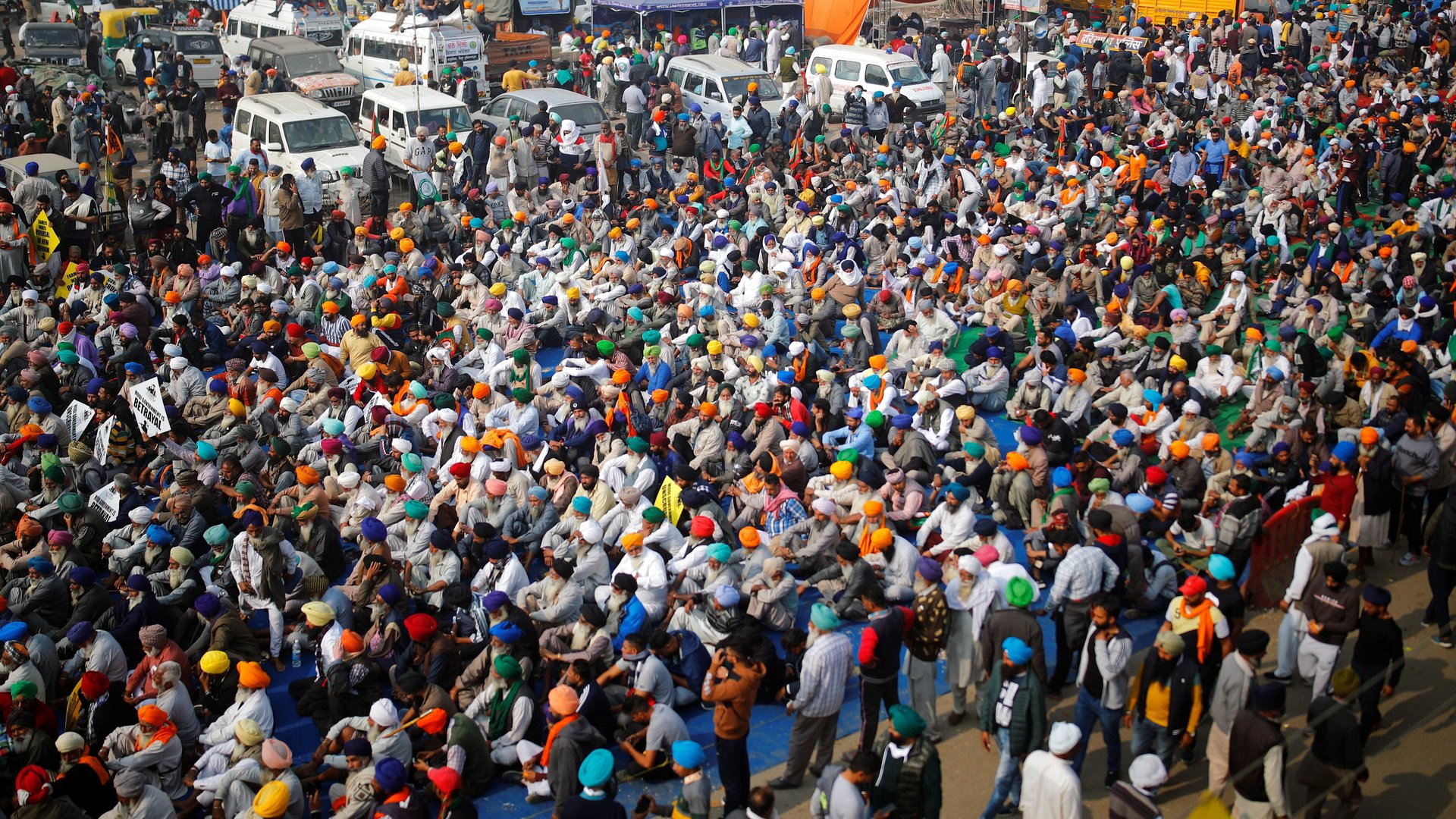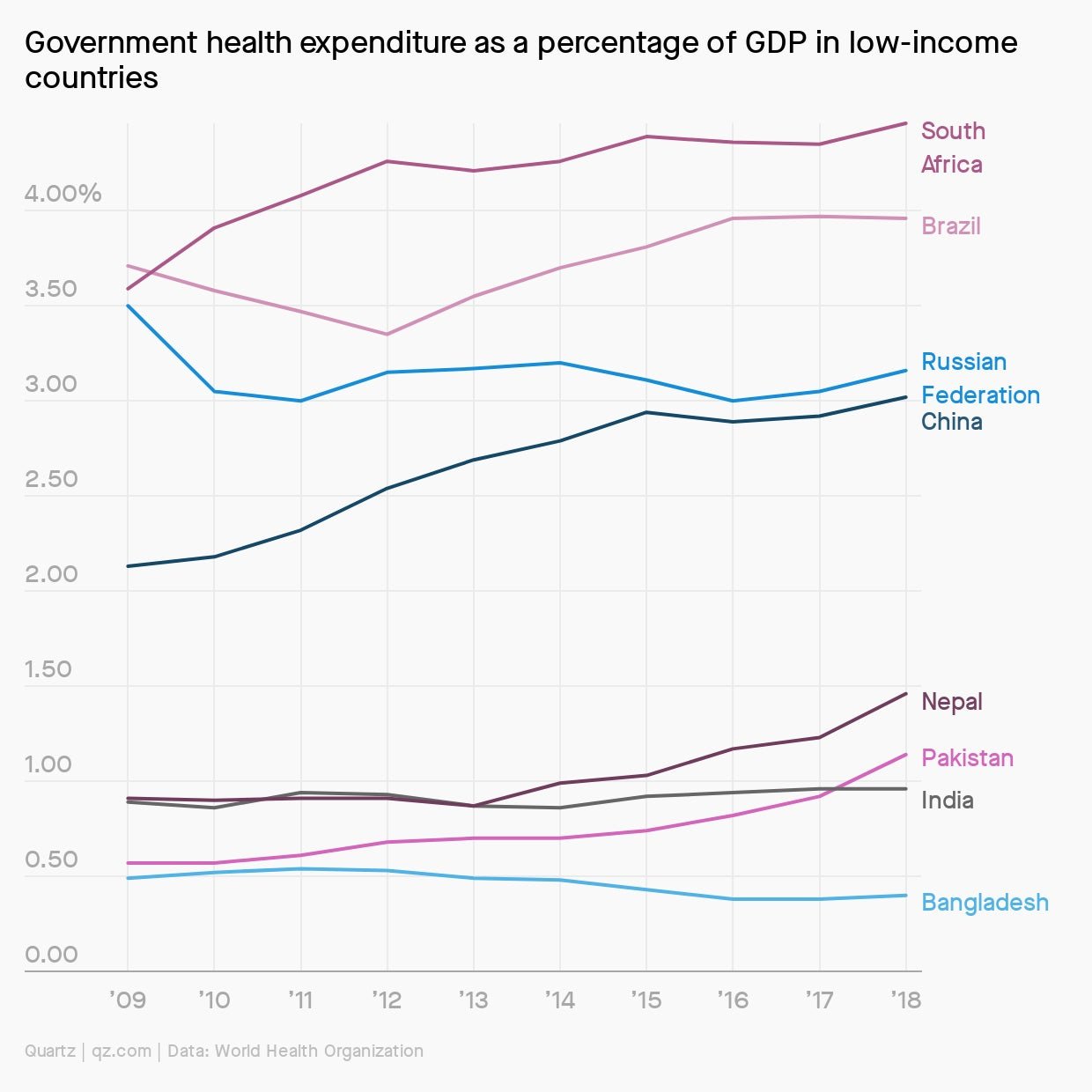US joins Covax, China’s vaccine diplomacy, prehistoric vegetarians
Good morning, Quartz readers!


Good morning, Quartz readers!
Here’s what you need to know
The US will join Covax. It’s reversing course and participating in the World Health Organization’s partnership to supply Covid-19 vaccines to low-income countries as part of a “wartime” coronavirus strategy. In Europe, officials said shipments of Pfizer’s vaccine to their countries have been cut in half.
Senate Republicans asked to delay Trump’s impeachment trial. Postponing the start of the trial until mid-February would give former US president Donald Trump more time to assemble a legal team and prepare his case. House speaker Nancy Pelosi has yet to send the impeachment article, which deals with “incitement of insurrection,” to the Senate.
India begins selling Covid-19 vaccines abroad. Brazil and Morocco will receive the first commercial exports of the Oxford-AstraZeneca jab produced by the Serum Institute of India today. Yesterday, a fire broke out at the vaccine producer’s facility and killed five people, but it will not interrupt vaccine production.
The EU Parliament questioned an investment pact with China. Members are preparing to pass a resolution next week against the deal, which will finally be published in full today. They say it has dented the EU’s credibility given China’s crackdown in Hong Kong.
Google threatened to pull search from Australia. Both Google and Facebook are fighting a proposed law directing the platforms to pay publishers for news content they display. Meanwhile in France, the search giant reached a deal to pay some 300 publishers for reusing their content.
Japan nixed Olympic cancellation rumors. A Japanese official disputed a British news report that said Japan had “privately concluded” the games couldn’t be held, and the Tokyo 2020 organizing committee said prime minister Yoshihide Suga was committed to the event.
Tourism isn’t back, but vaccine tourism is already a thing. The state of Florida is putting in place residency requirements for receiving vaccines, after reports that visitors from other states—and some from Argentina—had traveled there for the jabs.
What to watch for
After Twitter confirmed its decision to suspend the Chinese embassy’s account, many on China’s Twitter-like Weibo mocked the US company. “What is freedom of speech? Is it that the Weibo account of the US embassy in China can still voice its opinions, whereas the account of the Chinese embassy is locked by Twitter,” posted one user.
But there are crucial differences between Twitter’s move and censorship in China, notes Jane Li.
American social media companies usually give reasons when they ban high-profile users—in this case an offensive embassy tweet about an oppressed minority in China. Beyond that, a shuttered social media account doesn’t preclude leaders from televised interviews or public appearances.
Still, Twitter’s choice to silence an embassy and a lame duck president within the same month has made the debate over how governments and social platforms should deal with one another more important than ever.
Charting India’s healthcare budget
As finance minister Nirmala Sitharaman navigates the obstacle course between fiscal deficit and economic stimulus, her announcements for India’s healthcare sector in the upcoming budget will be closely watched, writes Manavi Kapur.

India’s spending on healthcare is among the lowest in the world. The impact of the consistently low share of budget allocation became apparent from the stress on India’s healthcare systems when the pandemic hit the country in March 2020.
This is why experts believe that the upcoming budget for fiscal year 2021-22, to be announced on Feb. 1, should put significantly more funding toward improving medical infrastructure in the country.
China’s vaccine diplomacy
During the early months of the pandemic, China angled for goodwill with its “mask diplomacy,” sending much-needed protective equipment to countries around the world. Now, as vaccines roll out globally, China’s “vaccine diplomacy” has taken a decidedly negative turn, Mary Hui explains.
Though much of China’s efforts have revolved around championing the Covid-19 vaccines of three domestic pharmaceutical firms, state propaganda has recently sought to undermine public trust in the vaccine developed by US pharmaceutical giant Pfizer and Germany’s BioNTech.
It’s a dangerous strategy, potentially fanning the flames of the anti-vaccine movement at a time when the World Health Organization has declared vaccine hesitancy as one of the world’s greatest health threats.
✦ A Quartz membership will never disappoint. Try it free for seven days.
You asked about second doses
What happens if you only get one dose of a Covid-19 vaccine?
Teaching your immune system to make antibodies is a bit like meeting a new friend: It takes a couple of introductions for the memory to really stick.
For your immune system, getting the first dose of a vaccine, is like meeting a new friend at a party: it may take a bit of time to get to know them. The second time you meet that same acquaintance, however, you can rely on your previous interactions as an introduction, and you may decide that you actually want to invest in a long-term friendship.
Similarly, your antibodies usually need to warm up before they’re ready for a prime-time response: They’ll kick into gear a couple of weeks after the first dose, but they’ll really respond to an incoming threat after the second.
Right now, the vaccines that are available from Pfizer-BioNTech, Moderna, AstraZeneca, Sinopharm (in China), and Sputnik (in Russia), require two doses; those who got the vaccine in clinical trials received two doses, and any estimates of efficacy are based on that dosing schedule. Pfizer-BioNTech released some data that showed that its vaccine was about 50% effective at blocking symptomatic Covid-19 after one dose, but single-dose efficacy for other vaccines isn’t yet available. Janssen’s vaccine only requires one dose, but it’s still in late-stage clinical trials.
The US Food and Drug Administration, which has authorized only the Moderna and the Pfizer-BioNTech vaccine strongly recommends administering vaccines by the schedules in which they were tested. The US Centers for Disease Control and Prevention, however, notes that if you have to wait longer than the three or four weeks to get a second shot, it’s probably okay; just don’t go below the recommended amount of time.
Surprising discoveries
Newly discovered fossils could be from the largest dinosaur yet. Good thing it only ate plants.
The White House put out a coded message. A job opportunity for programmers is (well, was) hidden in the HTML for whitehouse.gov.
Borrowing a dog lets Dutch residents out at night. Posing as a dog owner on a sanctioned walk is just one of their creative ways to skirt a new curfew.
Forgive me, Father, for stealing these ancient coins. A priest helped a penitent thief return 208 artifacts pilfered from an Italian museum.
A woman made soup with her pet koi. She said she didn’t want to waste the fish after they died unexpectedly.
Our best wishes for a productive day. Please send any news, comments, easy-to-find job ads, and pet-sharing arrangements to [email protected]. Get the most out of Quartz by downloading our iOS app and becoming a member. Today’s Daily Brief was brought to you by Tripti Lahiri, Ananya Bhattacharya, Katherine Ellen Foley, Jordan Lebeau, Liz Webber, and John Detrixhe.